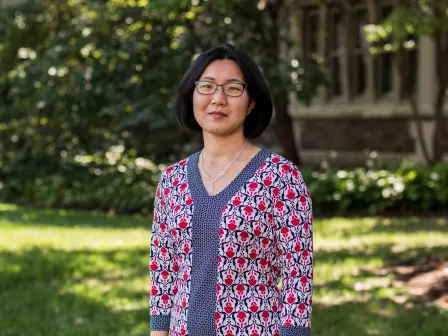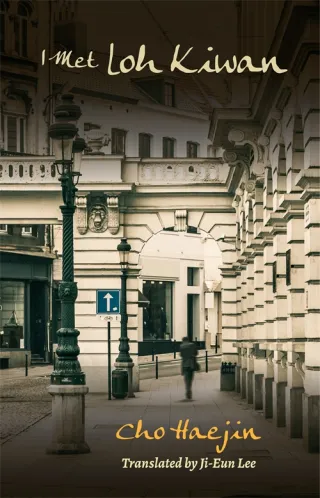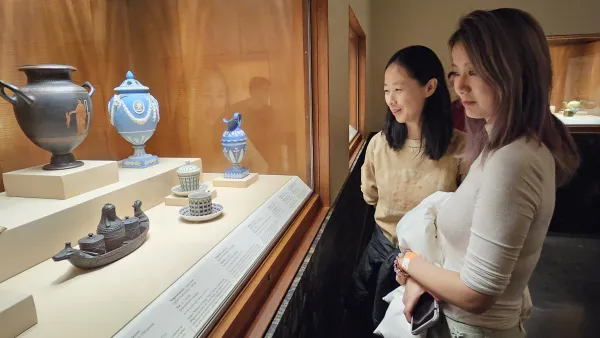Ji-Eun Lee, associate professor of Korean language and literature in Arts & Sciences, published a translation of Cho Haejin's short novel "I Met Loh Kiwan" earlier this year.
I Met Loh Kiwan follows North Korean refugee Loh Kiwan to a place where he doesn’t speak the language or understand the customs. In this Q&A, Lee talks about her creative process, the novel's powerful and nuanced portrayal of North Korea, and the meditative side of translation.

What is your translation process like?
I read the original several times first and also other works by the same author in order to have a feel for her voice and style, and a broader sense of the story she wants to tell. Then my rough draft was relatively quick: I went through sentences, more or less word by word, marking places that need resolving later. Subsequent read-throughs — five or more in total — focused on editing word choices, tweaking style, and in some cases allowing a looser rewrite that simply sounded better in English and conveyed the gist better than literal adherence to the original Korean would. All of this revision had the goal of producing a final product that read like an English original. Tim, my partner in life and all sorts of other fun things, has good eyes for details and helped substantially during this sometimes tedious process. As for time spent, I was in the middle of tenure review when I started the project, so the whole process took a while from start to finish, but the translation process itself, from the first iteration to polished version, took about two summers. (Then it got stuck in production for a couple of years.)
Why did you choose to translate Cho Haejin’s novel?
I did not choose it; it came to me. Sometime in 2012, the Literature Translation Institute of Korea (LTI-Korea) contacted me and asked if Washington University would be interested in hosting a Korean writer for their writer residency program. I was delighted and agreed, and Cho Haejin was sent to us in the fall of 2013. (She thought she was going to Washington D.C. — a happy misunderstanding for us!) She arrived with news that I Met Loh Kiwan had been awarded the prestigious Shin Dongyup Literary Prize. When LTI-Korea sent out inquiries to scholars of Korean literature asking for recommendations for translation, I suggested I Met Loh Kiwan without hesitation.

They then asked me if I’d be interested, and I accepted for a few reasons. A work that addressed refugee issues and North Korea was timely, but this work expanded these issues to ask larger questions about what it means to be human and humane. Guided by my own literary experience, I also appreciated a work whose reflex was not to politicize or fantasize about North Korea, but which preferred nuance and appreciation of a broader context of universal human questions and values. Contrasting with these characteristics of Cho Haejin's novel, I had used the first few pages from Adam Johnson’s Orphan Master’s Son in my translation class, in an exercise where students would translate a few pages into Korean. Although a fine dystopian novel on its own terms, my students and I felt uncomfortable with a fantastical portrait of North Korea given the urgency and sensitivity of real-world dynamics in that part of the world. Character names, vaguely Asian-sounding but definitely strange to Korean ears, further augmented the sense of remove from real-world concerns. The author was also invited to talk about North Korea — the country — in the media, and I felt uneasy about giving a dystopian novelist the role of commenter about the non-fantasy, complex, problematic country of North Korea. It was against that backdrop that I encountered Haejin’s work, and quickly admired how she de-exoticized North Korea by making Loh Kiwan, the protagonist, someone we all can identify with: a tender loving person who mourns the loss of his mother, his language, and his home. He also reflects on hardships in his own country so severe that they drove him and his mother to leave, and he wonders briefly what kind of leadership would put its own people through that. But these questions are real, his doubts remain unresolved, and his ruminations do not reduce to any easy verdict, in part because his experiences are too complex for reduction, and in part because his deepest preoccupations aren't about one people or country, but revolve around issues of compassion, love, loss, and principle common to people everywhere.
What words/phrases/concepts were particularly challenging to translate into English?
Differences between specific languages always pose specific problems for translation. Compared to English, some salient differences in Korean include word order (including but not limited to the basic SOV structure of Korean), less specificity with gender (in the Korean original, one doesn’t realize “Kim” is a woman until well into the novel), and frequent omission of subject and/or object (it may be ambiguous who is speaking, or to whom, and in the hands of a clever writer, such ambiguity can be potent). The Korean language also uses tense differently. Writers, for example, often use present tense for a lively effect, even if it’s something in the past or future. In that sense, tense may be more for emotional effect than specifying time in Korean language.
One major challenge with this novel was not really about words/phrases/concepts, but concerned the depths of Kim’s self-loathing. She’s almost incapacitated with guilt for the first half of the novel, which she expresses by being extremely harsh on herself and often harsh or even cruel toward others. The character seems to want readers to hate her too because she considers herself undeserving of sympathy. The challenge for translation was to render these torturous moments while maintaining at least a spark of sympathy for her among readers (or they may stop reading). Such a depth of self-loathing and self-sabotage also made for a tricky balance between two storylines: a sorrowful, tragic, yet inspiring story of Loh, and a self-involved, almost-hysterical portrait of Kim, which must resolve over time into an increasingly harmonious resonance between the two. In the end, translating this balance and transition meant having and reflecting on a deeply considered, subtle appreciation for the original which, for all the differences of execution entailed by translation, always showed clearly what the goal was.
"The goal is a deep resonance between what an original writer said in one language and expression in a target language whose music is significantly different."
What do you enjoy about translation work?
Among other things, it offers a kind of meditation, a word I used in the acknowledgment section. Compared to writing one's own work, which often involves wrestling with a thought or pulling your own hair out to resolve an idea or argument, translation is more contemplative. Not to say less profound or demanding, but the demand is more for a state of mind that fosters a nuanced appreciation for the carefully, artfully crafted words of others, achieved by letting them wash over and through you repeatedly. The goal is a deep resonance between what an original writer said in one language and expression in a target language whose music is significantly different. Finding that resonance, as I said, is for me more of a meditative, receptive process than the kind of creativity involved in producing a coherent argument or narrative that originates in one's own, often uncooperative mind.
Such meditation is also refreshing for a scholar whose workweek consists largely of time and energy spent on tasks other than reading for pleasure, the singular joy that led many literature scholars to choose the career. The meditative intimacy entailed in translating a story you first appreciated in the original — the extreme closeness to words, phrases, expressions, and affect that lead to a faithful rendering in another language — reassures one of the love for literature and art that brought you into the field.
Are there any other translation projects on the horizon for you?
Not immediately, although I may continue to translate a few short stories with my students in my classes, as I have done over the years. After Han Kang’s The Vegetarian won the Man-Booker International Prize, however, enhanced visibility has vastly increased the possibilities for commercial publication of Korean works, which means many Korean authors now have agents. Agents, in turn, act as liaisons for publishers and thus translation projects. I may pick up some short stories if works that I love do not find translators, but for now, I am back to writing monographs. On that front, I have two research projects going, one on travels and domesticity of Colonial Korean woman writers in the early 20th century, the other on memory and post-memory and writing history among Korean authors in the post-Cold War era (1990s- 2000s), which includes works by Han Kang and Cho Haejin.

